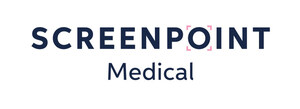NIJMEGEN, Netherlands, Jan. 18, 2022 /PRNewswire/ -- Following the success of the world's leading AI Breast Care system, Transpara®, now in use across the US and in 30 countries worldwide, ScreenPoint Medical, the company that developed Transpara, is to launch a major expansion.
The FDA and CE marked Transpara AI software reads mammograms to find cancers faster and at an earlier stage. 2022 will see a larger global team and further research and development resulting in an expansion of ScreenPoint's product portfolio. ScreenPoint will bring out new features faster to meet the growing global demand.
ScreenPoint Chief Executive, Professor Nico Karssemeijer said Transpara stands out with its validation in multiple studies across the globe, demonstrating the significant benefits of using deep learning artificial intelligence in mammography and tomosynthesis.
"Given the increasing demand for the product and with the pressure on radiologists and the increasing incidence of breast cancer worldwide, it is vital we make optimal use of this new technology to find cancers faster and earlier, especially the most aggressive ones, so that survival rates improve," he said.
"With the growing shortage of specialist breast radiologists worldwide and the negative impact of Covid related delays in screening, we have to do all we can to provide the best possible care to women at risk for breast cancer."
Transpara is now leading the way for prospective studies, peer reviewed publications and ongoing clinical studies in Europe and around the world.
Transpara is now being used in two prospective studies in Sweden and another in Spain with a second study also being proposed. In addition, in Denmark Transpara is being used in a major health service screening programme.
Professor Karssemeijer's comments have been echoed by a number of leading experts in breast care during an expert panel discussion during EUSOBI online.
Dr Sylvia Heywang Köbrunner of Munich said, "I think this is the future and we must adapt to the future. We cannot avoid it. It is so important to miss as few cancers as possible"
Dr Marina Benito of Hospital Universitario Reina Sofia, Spain agreed.
"In one of our studies, we have demonstrated that AI can help to identify up to 70% of the screening studies as very likely normal, reducing workload - without decreasing sensitivity and it also reduces recalls."
Dr Roger Yang of University Radiology Group, USA said, "We're seeing more and more adoption of digital breast tomosynthesis. DBT adds a lot more complexity, especially with comparisons to priors here in the States. Also, radiologists have to integrate and interface with software reporting systems. We're looking for ways to make screening more efficient."
For more information, please visit:
SOURCE ScreenPoint Medical

WANT YOUR COMPANY'S NEWS FEATURED ON PRNEWSWIRE.COM?
Newsrooms &
Influencers
Digital Media
Outlets
Journalists
Opted In






Share this article